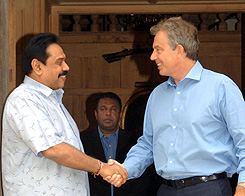A Brief Colonial History Of Ceylon(SriLanka)
Sri Lanka: One Island Two Nations
A Brief Colonial History Of Ceylon(SriLanka)
Sri Lanka: One Island Two Nations
(Full Story)
Search This Blog
Back to 500BC.
==========================
Thiranjala Weerasinghe sj.- One Island Two Nations
?????????????????????????????????????????????????Friday, August 28, 2015
On War Criminals & Privileged Holidaymakers
Ex British Prime Minister and multi-millionaire Tony Blair’s summer holiday in Sri Lanka has
been taking place under privileged conditions, with next to no media
exposure. A visit that takes place on the invitation of those holding
the reins of power in Colombo, the Blairs were provided with state
security and amenities during their visit. Two people who have played a
special role in facilitating this visit were, indeed, Mnagala Samaraweera MP andChandrika Kuamaratunga.
The former, a clothing design graduate of Central Saint Martin’s in
London, was also instrumental in fixing up a meeting between Tony Blair
and Mahinda Rajapaksa back
in 2006. That meeting took place in Britain, at a different time, for
Messrs Samaraweera, Rajapaksa and Blair. In the previous year,
Samaraweera played a frontline role in Rajapaksa’s presidential
campaign, which led to Rajapaksa’s election as Sri Lanka’s fifth
executive president. In that same year, Blair secured his third
re-election as British Prime Minister, with a parliamentary majority
slashed to a mere 66 seats (as opposed to UK Labour’s 160-seat majority
in the previous parliament). Having been Prime Minister since 1997,
Blair’s popularity was in decline. A key reason for this was Blair’s
decision to support the Bush administration’s war in Iraq, in the
absence of a 2nd UN resolution. At the 2005 general election, the
Liberal Democrats castigated Blair as responsible for the carnage that
was Iraq, an argument that won for them a good few disenchanted Labour
voters.
Flash forward to 2015.
Having just won the general election with a high count of preferential
votes, Samaraweera has been reappointed to a cabinet ministerial
portfolio somewhat removed, to say the very least, from his
profession-proper (i.e. fashion designer) – that of foreign affairs.
Indeed, Sri Lanka often distinguishes herself in appointing individuals
with no prior experience in diplomacy and/or international civil
service, no significant foreign experience, experience with
international consultancies, or remarkable foreign language skills
(other than Sinhala, Tamil and English) to spearhead its foreign policy
apparatus. Having said that, Samaraweera’s appointment is less
appalling, when compared with some of his predecessors, and more
alarmingly, the track record of foreign affairs ministers who happened
to be highly qualified, such as university professors. To borrow from
Paul Auster, the Music of Chance certainly appears to be in
Samaraweera’s favour in the 2015 quarter.
Rajapaksa
 Rajapaksa
was ousted from power in January 2015. Local specifics put aside, this
was the result of an operation that received U.S. and Indian
endorsement. Given the security challenges the USA is facing in the
South China Sea, there is a clear effort to ensure that USA-friendly
governments hold power across the South and Southeast Asian regions. In
this light, it was neither majoritarian politics, corruption nor
nepotism that caused disfavour for Rajapaksa internationally, but his
close ties with Beijing. Rajapaksa’s second attempt at a political
comeback was equally thwarted, through political machinations that
ensured the West’s preferred outcome. Media reports indicate that
Rajapaksa has nonetheless decided to remain in politics, most probably
to wait for a new opportunity to spearhead a Sinhala nationalist uproar
against the Ranil Wickremesinghe government. There is no question of the
fact that the Rajapaksa ousting has been favourable for media freedom
and fundamental rights. Domestically, a primary cause of public
disenchantment with the Rajapaksa administration stemmed from the myopic
policies of his siblings and preposterousness of his offspring. Despite
his downfall, Rajapaksa continues to command the support of a
considerable segment of the Sinhala community.
Rajapaksa
was ousted from power in January 2015. Local specifics put aside, this
was the result of an operation that received U.S. and Indian
endorsement. Given the security challenges the USA is facing in the
South China Sea, there is a clear effort to ensure that USA-friendly
governments hold power across the South and Southeast Asian regions. In
this light, it was neither majoritarian politics, corruption nor
nepotism that caused disfavour for Rajapaksa internationally, but his
close ties with Beijing. Rajapaksa’s second attempt at a political
comeback was equally thwarted, through political machinations that
ensured the West’s preferred outcome. Media reports indicate that
Rajapaksa has nonetheless decided to remain in politics, most probably
to wait for a new opportunity to spearhead a Sinhala nationalist uproar
against the Ranil Wickremesinghe government. There is no question of the
fact that the Rajapaksa ousting has been favourable for media freedom
and fundamental rights. Domestically, a primary cause of public
disenchantment with the Rajapaksa administration stemmed from the myopic
policies of his siblings and preposterousness of his offspring. Despite
his downfall, Rajapaksa continues to command the support of a
considerable segment of the Sinhala community.



